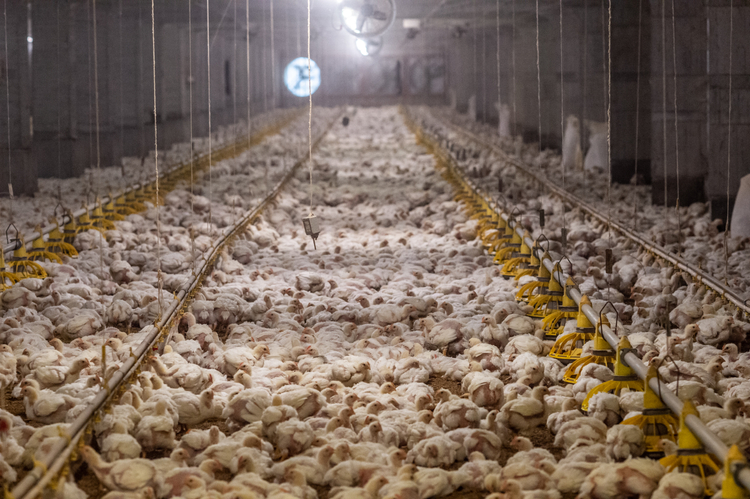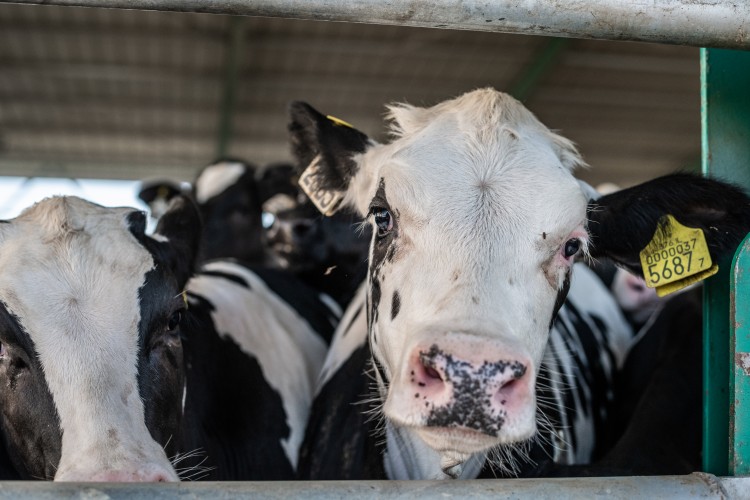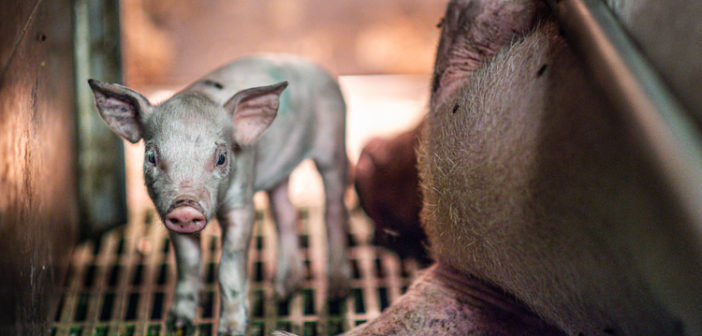The following is a personal view by Virginia Bell, member of Catholic Action for Animals, a group of practicing Catholics dedicated to promoting respect for animals within the Catholic Church.
The planet is in a bad state, and human activity is the cause. It’s not just climate change. The planet is suffering from destruction of rainforests, desertification of land, soil erosion, pollution, wasting of resources, loss of biodiversity, floods, droughts and so on. Many of these problems are part of a vicious cycle of damage, each increasing the harm of the others.
One of the worst causes of climate change and environmental damage as a whole is meat and dairy production and consumption. So why is so little information about this destructive business being publicized by Catholics?
Reasons that I have heard to excuse this neglect:
- People will be put off from doing anything if we don’t use a soft approach
- People should not be made to feel guilty
- People can’t take such bad news; panic will cause them to freeze and do nothing
- People who are poor shouldn’t be asked to do anything
As I will show, these reasons are specious. They are not valid. Nor are they sincere. They are excuses to enable the continuation of the exploitation of animals. After all, the whole of civilization is based on the enslavement and exploitation of animals, with the blessing of the Church. To completely reverse our culture, our conditioning, is not easy. Nevertheless, it is essential that we act with urgency on the matter of environmental degradation, which includes changing our agricultural practices from meat and dairy farming to organic arable farming.

Why the reasons to keep quiet about meat and dairy are invalid
First of all, those who know the seriousness of the situation have a duty to inform others of the facts, and of how to reverse the damage. Otherwise they are negligent of their duty to God, to the planet, and particularly to others who have a right to know the facts. What people do with the facts is up to them. They can make big or small changes in their lifestyles, or do nothing. That is up to their consciences. But freezing out of panic is not a likely reaction. Schoolchildren around the world, far from doing nothing out of panic, are taking to the streets to force a change from governments and local authorities.
Second, because the matter is urgent, we must use the language of urgency. This is what the Pope and the Global Catholic Climate Movement are saying. Why shouldn’t this urgency apply to educating about the meat and dairy business as well as about the other causes of climate change? Of course it should. Meat, dairy and fish production and consumption are a leading cause of greenhouse gas emissions, global warming, ocean dead zones, wasting of resources, global hunger, species extinction, pollution of land, sea and air, antibiotic resistance, pandemics and ill health. Don’t take my word for it; look it up for yourself.
Third, being aware of one’s culpability is a prerequisite for repentance and change. Some emotions associated with guilt are more to do with embarrassment and shame than with being aware of how one needs to change. Those are negative feelings and not helpful. The purpose of an examination of conscience is precisely to consider what we have done wrong and how to avoid doing it again.
The Vatican Overview of the Encyclical Laudato Si’, June 2015, ends with:
“After Laudato si’, the regular practice of an examination of conscience, the means that the Church has always recommended to orient one’s life in light of the relationship with the Lord, should include a new dimension, considering not only how one has lived communion with God, with others and with oneself, but also with all creatures and with nature.”
Fourth, it’s patronising to say let’s not tell people about something because they will worry. That is the attitude that allows governments to keep secrets from the people. Knowledge is power. Governments may prefer to hold on to knowledge for their own purposes, and to pretend that it is out of concern for others who do not have the ability to cope with the facts. This attitude assumes that the one with knowledge can cope, but other lesser humans can’t.

Fifth, poor people have as much right as rich people to be informed about matters that impact their lives, and about how their actions impact others. Governments should ensure that healthy food is affordable, and people have a right to demand this. Funds can come from taxes on unhealthy food. It’s patronizing to suggest that poor people are incapable of demanding action from governments on matters that will improve lives, including environmental concerns.
And lastly, the overriding reason for Christians to avoid meat and dairy is that their production and consumption causes suffering, on a massive scale, totally unnecessarily, to produce an unhealthy food which is responsible for many of our common illnesses, such as heart disease, strokes, diabetes, obesity, liver disease, hypertension, cancer etc. Fish consumption is also environmentally destructive, causing ocean dead zones, loss of biodiversity and pollution, and provides a food that is high in toxic matter.
If we imagine our fellow humans being treated in the same way as we treat farmed and caught animals, it would immediately appear unacceptable. Cutting parts of their bodies off with no anesthetic, hanging them by the legs, cutting their throats, plunging them into boiling water while conscious, incarcerating them in a way that deprives them of basic needs and ensures that each being is either damaged, sick or deformed. And, should there be a problem, burying them alive in mass graves.
We are called to be holy, not to be average. And that call to holiness includes our attitude and actions towards animals and the natural environment. They can’t be excluded from our responsibilities.
I am a Christian, therefore I am vegan. When that is the default state for the majority of Christians, Christ’s Kingdom will be visible on earth.
Featured image: a sow and piglet in a factory farm. Image credit Jo-Anne McArthur / Essere Animali.





